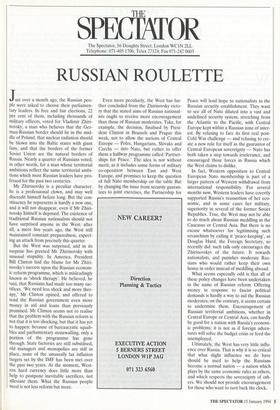The Spectator, 56 Doughty Street, London WC1N 2LL Telephone: 071-405
1706; Telex 27124; Fax 071-242 0603
RUSSIAN ROULETTE
Mr Zhirinovsky is a peculiar character: he is a professional clown, and may well discredit himself before long. But the con- stituency he represents is hardly a new one, and it will not disappear, even if Mr Zhiri- novsky himself is deposed. The existence of traditional Russian nationalists should not have surprised anyone in the West: after all, a mere five years ago, the West still maintained constant preparedness, expect- ing an attack from precisely this quarter.
But the West was surprised, and in its surprise has greeted Mr Zhirinovsky with unusual stupidity. In America, President Bill Clinton laid the blame for Mr Zhiri- novsky's success upon the Russian econom- ic reform programme, which is misleadingly known as 'shock therapy'. He believed, he said, that Russians had made too many sac- rifices. 'We need less shock and more ther- apy,' Mr Clinton opined, and offered to send the Russian government even more money in aid and loans than previously promised. Mr Clinton seems not to realise that the problem with the Russian reform is not that it is too shocking, but that it has yet to happen: because of bureaucratic squab- bles and parliamentary stonewalling, only a portion of the programme has gone through. State factories are still subsidised, old managers and monopolies are still in place, none of the unusually lax inflation targets set by the IMF has been met over the past two years. At the moment, West- ern hard currency does little more than help to postpone inevitable sacrifices, not alleviate them. What the Russian people need is not less reform but more. Even more peculiarly, the West has fur- ther concluded from the Zhirinovsky victo- ry that the stated aims of Russian national- ists ought to receive more encouragement than those of Russian moderates. Take, for example, the decision, finalised by Presi- dent Clinton in Brussels and Prague this week, not to allow the nations of Central Europe — Poles, Hungarians, Slovaks and Czechs — into Nato, but rather to offer them a halfway programme called 'Partner- ships for Peace.' The idea is not without merit, as it includes some forms of military co-operation between East and West Europe, and promises to keep the question of full Nato membership on the table But by changing the issue from security guaran- tees to joint exercises, the Partnership for Peace will lend hope to nationalists in the Russian security establishment. They want to see all of Nato diluted into a vast and undefined security system, stretching from the Atlantic to the Pacific, with Central Europe kept within a Russian zone of inter- est. By refusing to face its first real post- Cold War challenge — and refusing to cre- ate a new role for itself as the guarantor of Central European sovereignty — Nato has both taken a step towards irrelevance, and encouraged those forces in Russia which the West claims to dislike.
In fact, Western opposition to Central European Nato membership is part of a larger pattern of Western withdrawal from international responsibility. For several months now, Western leaders have covertly supported Russia's reassertion of her eco- nomic, and in some cases her military, superiority in several of the former Soviet Republics. True, the West may not be able to do much about Russian meddling in the Caucasus or Central Asia. But there is no excuse whatsoever for legitimising such revanchism by calling it 'peace-keeping', as Douglas Hurd, the Foreign Secretary, so recently did: such talk only encourages the Zhirinovskys of the future. It rewards nationalists, and punishes moderate Rus- sians who would rather keep their own house in order instead of meddling abroad.
What seems especially odd is that all of these policy changes have been undertaken in the name of Russian reform. Offering money in response to fascist political demands is hardly a way to aid the Russian moderates; on the contrary, it seems certain to undermine them. Encouragement of Russian territorial ambitions, whether in Central Europe or Central Asia, can hardly he good for a nation with Russia's econom- ic problems; it is not as if foreign adven- tures will solve the budget crisis or feed the unemployed.
Ultimately, the West has very little influ- ence over Russia. That is why it is so critical that what slight influence we do have should be used to help the Russians become a normal nation — a nation which plays by the same economic rules as others, and which respects the sovereignty of oth- ers. We should not provide encouragement for those who want to turn back the clock..













 Previous page
Previous page